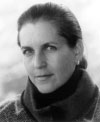|
||
The Open Space of Democracy BY TERRY TEMPEST WILLIAMS |
||
And it begins with our questions. I received a question from Merrilyne Lundahl, a graduating senior, that has become the question lodged within my own heart. How do I engage in responsive citizenship? This is the question I would like to challenge you with today. We are a nation emerging from the shadowed days of war. How do we engage in conversation at a time when the definition of what it means to be a patriot is being narrowly defined? You are either with us or against us. Discussion is waged in absolutes not ambiguities. Corporations have more access to power than people. We, the people. Fear has replaced discussion. Business practices have taken precedence over public process. It doesn’t matter what the United Nations advises or what world opinion may be. America in the early years of the 21st century has become a force unto itself. The laws it chooses to abide by are its own. What role does this leave us as individuals within a republic? How do we engage in responsive citizenship in times of terror? I would submit we can protect and preserve the open space of democracy by carrying a healthy sense of indignation within us that will shatter the complacency that has seeped into our society in the name of all we have lost, knowing there is still so much to be saved. What does the open space of democracy look like? In the open space of democracy there is room for dissent. In the open space of democracy there is room for difference. In the open space of democracy, the health of the environment is seen as the wealth of our communities. We remember that our character has been shaped by the diversity of America’s landscapes and it is precisely that character that will protect it. Cooperation is valued more than competition; prosperity becomes the caretaker of poverty. The humanities are not peripheral, but the very art of what it means to be human. In the open space of democracy, beauty is not optional, but essential to our survival as a species. And technology is not rendered at the expense of life, but developed out of a reverence for life. The open space of democracy provides justice for all living things and extends our notion of community to include plants, animals, rocks, and rivers, as well as human beings. It is a landscape that encourages diversity and discourages conformity. When minds close, democracy begins to close. Fear creeps in, silence overtakes speech. Rhetoric masquerades as thought. Dogma is dressed up like an idea. And we are told what to do, not asked what we think. Security is guaranteed. The lie begins to carry more power than the truth until the words of our own founding fathers are forgotten and the images of television replace history. An open democracy inspires wisdom and the dignity of choice. A closed society inspires terror and the tyranny of belief. We are no longer citizens. We are mediaengineered clones wondering who we are and why we feel alone. Lethargy trumps participation. We fall prey to the cynicism of our own resignation. When democracy disappears, we are asked to accept the way things are. I beg you as graduates of this distinguished university, do not accept the way things are. Question. Stand. Speak. Act. Patriots act—they are not handed a piece of paper called by that same name and asked to comply. It was true in 1776. And it is true in 2003. This is the commitment we make to a living, breathing, evolving republic. Thomas Jefferson said, “I believe in perilous liberty over quiet servitude.” To all of you graduates, may you commit yourselves to “perilous liberty.” This is the path of intellectual freedom and spiritual curiosity. Our insistence of democracy is based on our resistance of complacency. To be engaged. To participate. To create alternatives together. We may be wrong. We will make mistakes. As our beloved J.D. Williams has so brilliantly said, “Democracy is built upon the right to be insecure.” We are vulnerable. And we are vulnerable together. Democracy is a beautiful experiment. This is what the open space of democracy looks like. As you step outside this morning with your diploma in hand, may you celebrate your accomplishments. May you make vows, prayers to your highest and deepest self, that you will allow your soul to be used for the greatest good with all your gifts and talents. May you follow your heart. Question. Stand. Speak. Act. Make us uncomfortable. Make us think Make us feel. Keep us free. Something within you has been set in motion—this is the gift of your education. This is the open space of democracy. —Writer and activist Terry Tempest Williams BS’79 MS’84 is the author of Refuge: An Unnatural History of Family and Place and Red: Passion and Patience in the Desert. |
||

 I came to understand through an education
in the humanities that knowledge is
another form of democracy, the freedom of
expression that leads to empathy.
I came to understand through an education
in the humanities that knowledge is
another form of democracy, the freedom of
expression that leads to empathy.